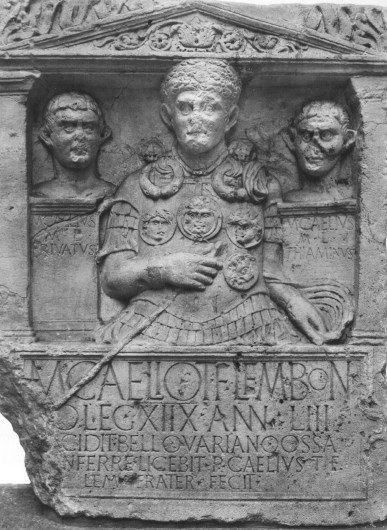Benario, Herbert W. "Arminius into Hermann:
History into Legend." Greece and Rome 51, number 1 (2004): 83-94.
The evolution of Arminius into a German
national hero.
_______________. "Bellum Varianum."
Historia 35, number 1 (1986): 114-115.
A German scholar had questioned the interpretation
of the phrase bello Variano on the cenotaph of Marcus Caelius.
Benario argues against the interpretation suggested by this scholar ("the
war of the Germans against Varus") and insists that the conventional
interpretation ("Varus' war") must be correct. "It strikes
me as idle to expect that an inscription which refers to the disaster
. . . would have any other name than his. The responsibility was his own,
for carelessness and overconfidence (p.115)."
_______________. "Teutoburg." Classical
World 96, number 4 (2003): 397-406.
Benario places the blame for the disaster
squarely on the shoulders of Quinctilius Varus: "Had a capable and
experienced general been in command of legions XVII, XVIII, and XVIIII
in that fateful year . . . the disaster ever since linked with the names
of Arminius and the Teutoburg Forest would, in all likelihood, not have
occurred (p. 402)."
Decisive Battles: Herman the German (2008)
A video about the battle, produced by the
History Channel. It is available via DVD
or YouTube.
Harnecker, Joachim. Arminius, Varus, and
the Battlefield at Kalkriese. Translated by Erika Strenski. Bramsche:
Rasch, 2004.
This is the publication associated with
the museum / archaeological site connected to the location of the battle.
Excellent photographs and diagrams.
Hope, Valerie M. "Trophies and Tombstones:
Commemorating the Roman Soldier." World Archaeology 35, number
1 (2003): 79-97.
A general discussion of Roman funeral mounuments,
with the cenotaph of Marcus Caelius offered as an example.
Lapham, Lewis H. "Furor Teutonicus:
The Teutoburg Forest, AD 9." In What If? The World's Foremost Military
Historians Imagine What Might Have Been. New York: Putnam, 1999.
Lapham, though not a true classical scholar,
offers some thoughts on how the victory of Arminius may have led to the
destructive German nationalism of the 20th century.
Murdoch, Adrian. Rome's Greatest Defeat:
Massacre in the Teutoburg Forest. Gloucestershire: Sutton, 2006.
A very lucid and readable discussion of
the battle and its implications.
Oldfather, W.A. "The Varus Episode."
Classical Journal 11, number 4 (1916): 226-236.
Like most historians, ancient and modern,
Oldfather does criticize the actions of Varus. He does, however, also
question whether Augustus really had any serious interest in conquering
the territory east of the Rhine.
Pagan, Victoria E. "Actium and Teutoburg:
Augustan Victory and Defeat in Vergil and Tacitus." In Clio and the
Poets: Augustan Poetry and the Traditions of Ancient Historiography,
edited by D.S. Levene and D.P. Nelis. Boston: Brill, 2002.
A discussion of two interesting flashback
sequences, both of which relate to Augustus: Vergil's flashback to the
victory at Actium and Tacitus' flashback to the defeat at the Teutoburg
Forest.
_____________. "Beyond
Teutoburg: Transgression and Transformation in Tacitus Annales 1.61-62."
Classical Philology 94, number 3 (1999): 302-320.
A detailed, eloquent analysis of Tacitus'
description of the battlefield: "There the soldiers of Germanicus
come face to face with the vision of Varus' men. Time and space collapse
into a point of absolute zero (p. 308)."
Reinhold, Meyer. "Marcus Agrippa's Son-in-Law
P. Quinctilius Varus." Classical Philology 67, number 2 (1972):
119-121.
Varus was indeed a well-connected member
of the Augustan inner circle . . . and perhaps these connections won him
an appointment in Germania that he really wasn't qualified to fill.
Wells, Peter S. The Battle That Stopped
Rome: Emperor Augustus, Arminius, and the Slaughter of the Legions in the
Teutoburg Forest. New York: Norton, 2003.
A well-researched text, supplemented by
many excellent maps, diagrams, and photographs.
Wishart, David. Ovid. London: Sceptre,
1995.
This is a historical novel rather than
a scholarly monograph, but it does propose a rather clever conspiracy
theory about the battle.
